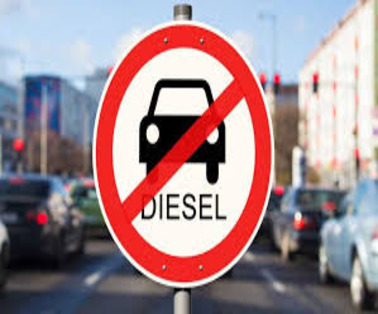Ban on diesel vehicle: A panel formed by the Ministry of Petroleum and Natural Gas has recommended a ban on the use of diesel-powered four-wheel vehicles by 2027 in cities with a population of more than 1 million, and instead transition to electric and gas-fueled vehicles. The Energy Transition Advisory Committee was headed by former petroleum secretary Tarun Kapoor
Key Points On Ban On Diesel Vehicles
- No city buses should be added that are not electric by 2030, with diesel buses for city transport not to be added from 2024 onwards.
- Partially shift to electric and partially to ethanol-blended petrol with almost 50% share in each category.
- Targeted extension of incentives under the Faster Adoption and Manufacturing of Electric and Hybrid Vehicles scheme (FAME).
- New registrations of only electric-powered city delivery vehicles should be allowed from 2024, with higher use of railways and gas-powered trucks for the movement of cargo.
- Long-distance buses in India be powered by electricity in the long term, with gas used as a transition fuel for 10-15 years.
- Building underground gas storage equivalent to two months’ demand.
- The use of depleted oil and gas fields, salt caverns, and aquifers for building gas storage with the participation of foreign gas-producing companies.
Ban On Diesel Vehicle Background

Issue With The Proposal of Ban On Diesel Vehicle
- It is not yet clear how the proposal for a ban, if accepted, will unfold in the case of medium and heavy commercial vehicles that are used for the transport of goods on highways, and for buses plying in most Indian cities, where diesel is the mainstay.
- Even if the ban on diesel for commercial vehicles were to have a longer transition time, significant disruption could still happen.
- Around 87% of diesel fuel sales are in the transport segment, with trucks and buses accounting for about 68%.
- While it seems easier at the moment to convert diesel trucks to compressed natural gas (CNG), there are certain limitations — including CNG being used for shorter distances, and its lower tonnage carrying capacity.
- Also, many auto industry players argue that carmakers having a presence in the diesel segment are already in compliance with current emission norms, and have invested heavily to transition their diesel fleet from BS-IV to BS-VI emission norms.
What Is The Reason People Prefer Diesel Vehicles?
- The higher fuel economy of diesel engines over petrol powertrains is one factor.
- This stems from the greater energy content per litre of diesel, and the inherent efficiency of the diesel engine.
- Diesel engines do not use high-voltage spark ignition (spark plugs), and thus use less fuel per kilometre, as they have higher compression ratios, making it the fuel of choice for heavy vehicles.
- Also, diesel engines offer more torque (rotational or turning force), and are less likely to stall as they are controlled by a mechanical or electronic governor, thereby proving to be better for haulage.
Current Status Of Diesel Vehicles
- The Indian car buyers with diesel cars accounting for 48% of passenger vehicle sales in the country in 2013.
- The main reason was the sharply lower price of diesel as compared to petrol — a Rs 25 per litre at its peak.
- But this changed when the decontrol of fuel prices started in late 2014. The price difference has since come down to around Rs 7 per litre — the closest the two fuels have been in price since 1991.
- Consequently, diesel cars accounted for less than 20% of overall passenger vehicle sales in 2021-22, less than half the share they had five years ago
Which Countries Want To Ban On Diesel Vehicles?
- In February, the European Parliament gave green light to a new legislation to ban the sale of petrol and diesel cars from 2035.
- Under the law, all cars and vans sold in the European Union must be zero-emission by 2035. This came amid EU’s efforts to switch to electric vehicles.
- The United Kingdom has planned to ban the sale of new petrol- and diesel-engine cars by 2030, while all new cars and vans sold must be fully zero emission by 2035.
- Norway wants to ditch fossil fuel-powered cars by 2025, much before other countries.
- Belgium’s Brussels has committed to remove all diesel cars from the roads by 2030.
- Japan has committed to phase out fuel-powered vehicles and boost EV sales. By the mid-2030s, it wants all new vehicles sold in the country to be hybrid or electric.
To Download Monthly Current Affairs PDF Click here
Get Inspiration from CLAT 2025 Topper
Click here to get a free demo
Everything About CLAT 2025



